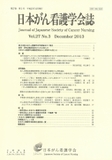Japanese
English
- 販売していません
- Abstract 文献概要
- 参考文献 Reference
要旨
本研究の目的は,がん患者の倦怠感の概念特性を明らかにすることである.2011年8月までで,キーワードを医中誌Webは「倦怠感」「がん」,CINAHL,MEDLINE,PsycINFOは「fatigue」「cancer」として検索し,がん患者の倦怠感に関する論文から62文献を選定した.Rodgersの概念分析の手法を用いて,対象文献から概念の属性,先行要件,帰結を抽出した.分析の結果,【エネルギー低下】【不確かな感覚】【制御不能性】【変動性】の4つの属性と,【がんの疾患特性と治療パターン】【内的・外的環境の変化】【基本属性】の3つの先行要件が抽出された.さらに,【対処行動】【QOLの低下】【生存期間の短縮】の3つの帰結が導き出された.本概念は「身体的・精神的・認知的な【エネルギー低下】を伴う【不確かな感覚】で,がんやその治療,【内的・外的環境の変化】の影響を受けながらレベルやパターンが多様に【変動】し,【制御不能性】の感覚をもたらす」と定義された.倦怠感の緩和はがん看護における重要な課題であり,身体症状やストレスのマネジメントを強化することや生活機能を維持する支援が有用と考えられた.また,日本におけるさまざまな種類のがんや治療における倦怠感の変動性や効果のある対処方法を明らかにしたうえで,対象の状況に適した介入プログラムの考案,ソーシャルサポートシステムの構築が,今後の課題である.
Abstract
Purpose: The purpose of this study was to clarify the characteristics of fatigue in cancer patients. Method: Relevant literature retrieved until August 2011 from four databases: Ichushi Web, CINAHL, MEDLINE, PsycINFO, using search terms, 'fatigue' and 'cancer' yielded sixty-two articles. Using Rodger's model of concept analysis, we extracted attributes, antecedents, and consequences of the concept. Results: Four attributes of the concept 'fatigue in cancer patients' were identified: 1)lack of energy; 2)sense of uncertainty; 3)uncontrollable; and 4)changeable. Three antecedents were identified: 1)characteristics of cancer and pattern of treatments; 2)change of internal or external environment; and 3)patients characteristics. Three consequences were identified: 1)coping behavior; 2)lower quality of life; and 3)reduction of survival time. Discussion and Conclusion: Through concept analysis fatigue in cancer patients was defined as: a sense of uncertainty with lack of energy which produced a sense of uncontrollability resulting from the changeable influences of cancer and its treatment, and the changes of internal or external environments. These results suggest that patients needs accessibility to intervention that enhance physical and psychological symptom management, and maintaining of living functions. Nurses need to identify patterns of fatigue in cancer patients in Japan and build suitable programs that include social support systems.
Copyright © 2013, Japanese Society of Cancer Nursing All rights reserved.


